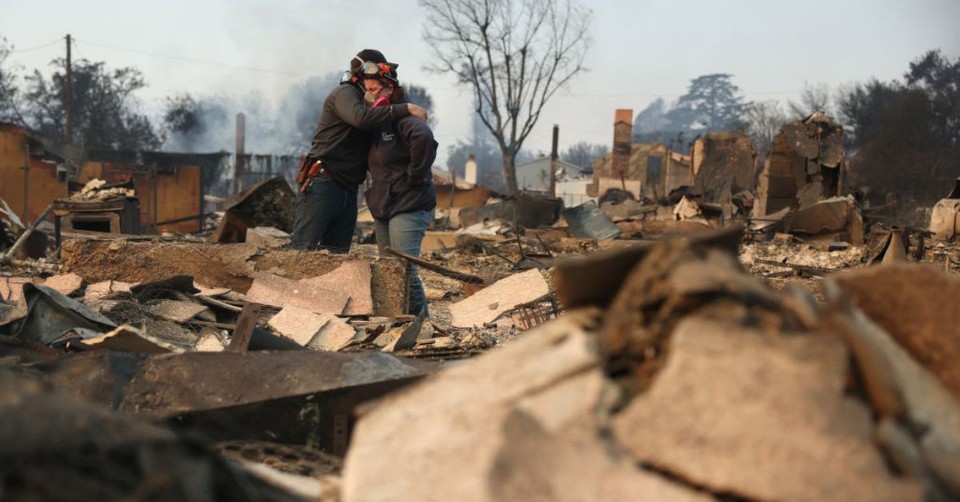What Is the Church's Calling During a Crisis?

When disaster strikes, the immediate needs are often physical — shelter, food, medical care — but the emotional and spiritual toll can be just as significant. Over 15 years of leading church networks in crisis response, I’ve learned that in these moments of significant need, the role of the Church is clear: to step into the chaos to reveal the love and goodness of God as a Good Samaritan, walking with survivors until they are back on their feet. As hurricanes ravaged communities last year and wildfires rage today, we must rise to meet these challenges with compassion, strategy, and unwavering faith.
Why the Church Must Show Up
In Matthew 25, Jesus reminds us of our accountability to care for “the least of these:”
“The King will reply, ‘Truly I tell you, whatever you did for one of the least of these brothers and sisters of mine, you did for me.’” (Matt. 25:40, NIV)
When catastrophes hit, God is often put on trial, as many survivors find themselves questioning God’s love and goodness. Insurance companies label natural disasters as "acts of God," and the devil whispers lies about God’s indifference. The Church must counter these narratives by embodying Christ’s compassion and hope. If we fail to show up during these critical moments, we risk leaving people in their brokenness, reinforcing the belief that God doesn’t exist, or He doesn’t love them.
Material aid and debris removal is important, but it is not enough. In disaster zones, I’ve seen churches excel at providing immediate relief — distributing food, cleaning homes and offering shelter. However, true crisis response requires a long-term commitment to walking alongside survivors until they can rebuild their lives. The Good Samaritan didn’t just tend to the man’s wounds; he ensured he was cared for until he was fully restored. The Church must do the same.
In 2005, Hurricane Katrina brought 6,000 evacuees to Austin, Texas. These survivors, stripped of everything, arrived with only the clothes on their backs. At the time, neither the city nor the Church was prepared. What unfolded in the following weeks shaped my calling and became a pivotal moment in my life. Seeing the overwhelming need, I took time off from work to help survivors find refuge within our church community. But it was during those chaotic days that the Lord gave me a vision — a church network capable of responding to crises effectively and compassionately.
The vision didn’t materialize overnight. When I first shared the idea with church leaders, the timing wasn’t right. Yet, God’s timing is always perfect. Three years later, as Austin faced an unprecedented influx of 44,000 evacuees due to successive hurricanes, the Church found itself largely sidelined. Early missteps—such as insensitivity to survivors' suffering — had damaged trust. It was a painful but necessary wake-up call, and it laid the foundation for a united coalition of churches committed to serving as the hands and feet of Christ in times of crisis.

Photo Credit: Canva Pro
Unity in the Face of Crisis
One of the greatest challenges in crisis response is the fragmentation within the body of Christ. Denominational divides and personal egos often hinder collaboration. Yet, when we put aside our differences and unite under God’s vision, miraculous things happen. During Hurricane Harvey in 2017, our network faced the daunting task of serving over 13,000 displaced families in Port Arthur, Texas. The scale of the need was overwhelming, and our resources seemed insufficient. But by God’s grace, we mobilized 1,000 Christian volunteers, secured 20 buses, brought one million dollars in gift cards, set up five bounce houses and games for children, and coordinated seven semis of food and nine semis filled with other needed supplies — all within ten days.
This experience reinforced a powerful truth: God equips us for the tasks He calls us to. In other words, He makes it look like we know what we’re doing! When we step out in faith, trusting Him to fill the gaps, we witness His provision and power in ways we could never imagine.
The Call to Be the Good Samaritan
Crises reveal the brokenness of our world and the deep spiritual needs of those affected. They also provide the Church with an unparalleled opportunity to demonstrate God’s love. As the Good Samaritan stopped to care for a man left for dead, we too must stop, see the suffering around us, and act. This requires more than good intentions; it demands preparation, collaboration, and a willingness to surrender our human-sized dreams for God-sized visions. It requires us to courageously and compassionately face a survivor’s reality, willing to bear it with them to alleviate their suffering and completely care for them until they are back on their feet.
The Church is uniquely positioned in the community to meet not only the physical needs of disaster survivors but also their emotional and spiritual needs. In doing so, we reflect the heart of Christ and offer a powerful testimony of His goodness.
A Call to Action
As hurricanes, wildfires, and other crises continue to devastate communities at ever-increasing rates, I challenge churches everywhere to unite, prepare, and respond. Build networks that can mobilize quickly. Train volunteers to meet both practical, emotional, and spiritual needs. And, above all, remember that our success is not measured merely by the number of meals served or homes rebuilt but by the lives transformed through the love of Christ and the gospel.
Let us not be a Church that walks by a survivor on the other side of the road, hoping that someone else will help them. Let us be the Good Samaritan, revealing the goodness of God in the darkest moments. Together, we can bring healing, hope, and restoration to a broken world.
Photo Credit: ©Getty Images/Justin Sullivan/Staff
Daniel Geraci is the Founder and CEO of United in Crisis, a training organization focused on uniting and equipping churches around the globe to form local crisis response church networks that meet the emotional, spiritual, and physical needs of survivors. In May 2024, Geraci released his debut book, United in Crisis: A True Story of God's Miraculous Power Working Through a United Network of Churches.
Originally published January 27, 2025.





